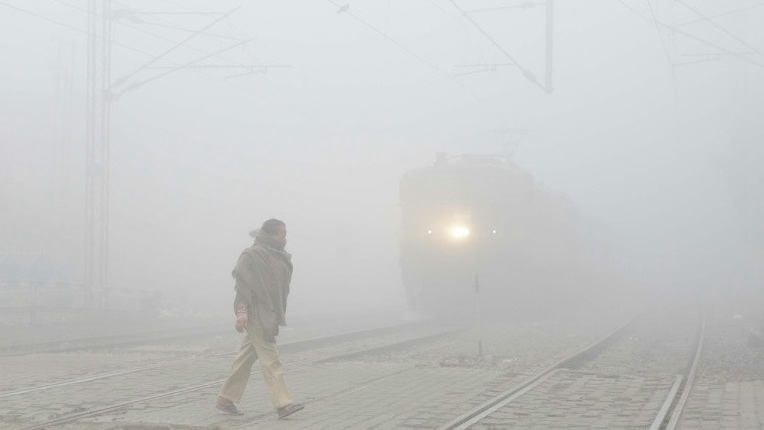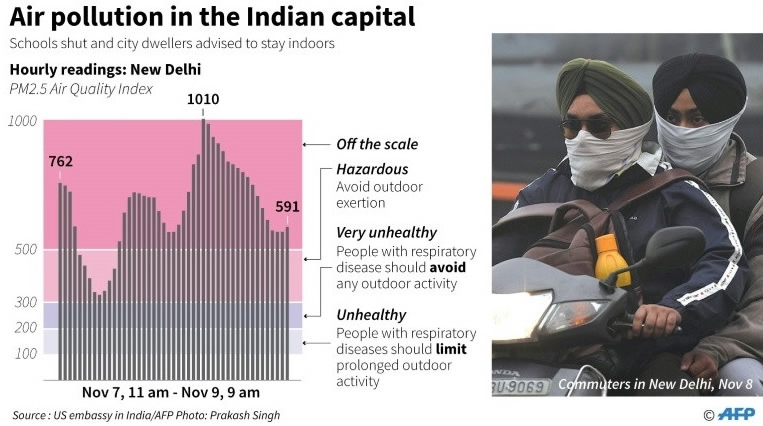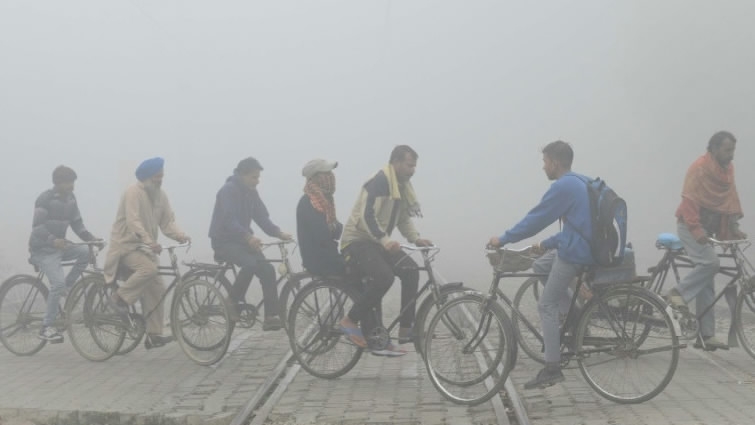
Tech & Sci
08:06, 10-Nov-2017
Thousands of schools close as smog envelopes India, Pakistan

Schools closed across large swathes of north India on Thursday as a hazardous fog of toxic pollution cloaked the region for a third day, with growing calls for urgent government action to tackle what doctors are calling a public health emergency.
Punjab's government said it was closing all 25,000 schools in the state for the rest of the week due to the acrid air blanketing north India and parts of neighboring Pakistan.
The decision came a day after Delhi authorities ordered all 6,000 schools in the capital to shut until Sunday.
Low winds and the annual post-harvest burning of crop stubble in Punjab and neighboring areas have caused the levels of dangerous pollutants in the air to spike to many times the levels considered safe.
Air quality typically worsens before the onset of winter as cooler air traps pollutants near the ground and prevents them from dispersing into the atmosphere, a phenomenon known as inversion.

Air pollution in the Indian capital /Photo via AFP
Air pollution in the Indian capital /Photo via AFP
Figures on the US embassy website showed levels of PM2.5 – the smallest particulates that cause most damage to health – spiked at over 1,000 on Wednesday afternoon in Delhi, though by Thursday they had fallen to 590.
The World Health Organization's guidelines say 25 is the maximum level of PM2.5 anyone can safely be exposed to over a 24-hour period.
Doctors say the microscopic particles can penetrate deep into the lungs, increasing the risk of heart attacks and strokes.
"Delhi once again has become a veritable gas chamber with denizens finding it difficult to breathe," The Times of India said Thursday, joining growing calls for government action to curb the chronic pollution, which the Indian Medical Association this week termed a public health emergency.
"Air pollution during winter months has become a catastrophe for large parts of north India," the country's most read English-language newspaper said in an editorial blaming "political apathy".
"It's high time the question is asked: why can't authorities enjoying jurisdiction over the national capital of an aspiring great power... come up with concrete measures to tackle the world's worst air pollution."
As pressure mounted on the government, authorities in Delhi ordered a ban on all construction work and barred lorries from entering the city.
Around 50,000 mostly diesel-fuelled lorries pass through India's capital every night and they are a major contributor to the pollution plaguing the city.
Struggling to respond

PM2.5 is the smallest particulates that cause most damage to health. /Photo via AFP
PM2.5 is the smallest particulates that cause most damage to health. /Photo via AFP
It is the second year running that Delhi has faced such high levels of PM2.5. Media reports said the thick smog had also led to a series of road accidents in north India.
Eight students were killed late Wednesday when a truck ploughed into them as they waited for a bus on a roadside in Punjab.
Since 2014, when WHO figures showed the extent of the crisis, authorities in Delhi have closed power plants temporarily and experimented with taking some cars off the road.
But the temporary measures have had little effect.
Under pressure to respond, Delhi's Chief Minister Arvind Kejriwal on Thursday sought to blame stubble burning by farmers in neighboring states.
"We will continue facing this every year until the neighboring state governments resolve the issue of crop burning," he told reporters in Delhi.
The practice of burning crop stubble remains commonplace in north India despite an official ban.
Kejriwal said his government would decide in the next day or two whether to reintroduce restrictions on driving cars in the city.
3789km
Source(s): AFP

SITEMAP
Copyright © 2018 CGTN. Beijing ICP prepared NO.16065310-3
Copyright © 2018 CGTN. Beijing ICP prepared NO.16065310-3